Tooth Decay से कैसे बचें: बच्चों और बड़ों के लिए आसान टिप्स
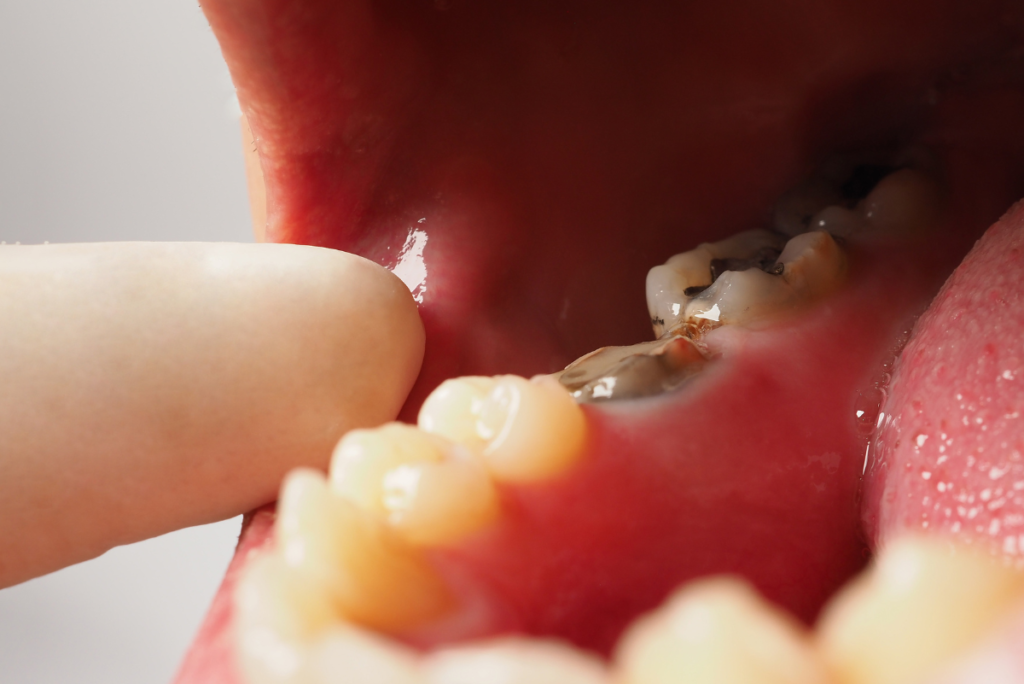
Related Articles Tooth Decay से कैसे बचें: बच्चों और बड़ों के लिए आसान टिप्स Braces: Your Path to a Perfect Smile (दांतों में तार लगवाना) Broken Jaw: Causes, Symptoms, and Treatments फ्रैक्चर्ड जबड़ा: कारण, लक्षण और उपचार The Benefits of Fluoride for Dental Health What Are Dental Implants? A Complete Guide The Ultimate Guide to Smile Makeovers for Teens Tooth Decay से कैसे बचें: बच्चों और बड़ों के लिए आसान टिप्स Written by Dr. Abhinav Kansal, BDS, MDS (Endodontist) Founder and Chief Dental Specialist at Kansal Dental Care, Meerut Tooth decay, also known as dental caries, is a common problem affecting people of all ages, from young children to adults. Untreated tooth decay can lead to severe pain and further health issues. This blog provides you with insights into the causes, symptoms, and preventive measures for tooth decay to keep your family’s teeth healthy. Understanding Tooth Decay Tooth decay occurs when the enamel (the outer layer of the tooth) is weakened over time by bacteria and acids. This typically happens when we consume foods high in sugars and carbohydrates. In this blog, we’ll discuss easy and effective ways to prevent tooth decay. Causes and Risk Factors Tooth decay has many causes, including: High Sugar Intake: Sugary drinks, chocolates, and sweets feed bacteria, causing tooth decay. Improper Brushing Techniques: Not brushing correctly or long enough can contribute to decay. Poor Oral Hygiene: Neglecting daily dental care allows bacteria to build up. Lack of Fluoride: Fluoride is essential for strong teeth, and its deficiency can lead to decay. Genetic Predisposition: Some people are genetically more prone to tooth decay. Misconception: A common myth is that only sugary foods cause decay. In reality, any food high in carbohydrates can contribute to decay. Symptoms and Early Warning Signs Early signs of tooth decay can include: Mild Tooth Pain: Slight pain or sensitivity in the teeth. White or Brown Spots: Spots may appear on the tooth’s surface. Bad Breath: Persistent bad breath is often an early sign. Visible Cavities: Small holes or cavities in teeth may begin to appear. Ignoring these symptoms can lead to more severe issues, including the need for root canal treatment or extraction. Diagnosis Process To diagnose tooth decay, dentists use the following process: Oral Examination: A thorough visual check of the teeth and gums. X-Ray: To determine the depth and extent of decay. Visual and Diagnostic Tools: Special lights and tools help the dentist inspect tooth surfaces. Treatment Options Treatment depends on the stage of tooth decay: Fillings: If caught early, a filling can restore the tooth. Root Canal Treatment: Needed if decay reaches deep into the tooth. Crowns: Used to strengthen a weakened tooth. Extraction: When a tooth is severely damaged, it may need removal. Preventative Measures Here are some simple, effective ways to prevent tooth decay: Brush Twice Daily: Once in the morning and once before bed. Floss Regularly: Clean between teeth to remove food particles. Limit Sugary Foods: Avoid sugary drinks and snacks. Use Fluoride Toothpaste: Fluoride strengthens tooth enamel. Regular Dental Checkups: Visit your dentist every six months for a checkup. Suggestions for Symptom Management To manage mild symptoms of tooth decay at home: Salt Water Rinse: Gargle with warm salt water twice a day to reduce bacteria. Over-the-Counter Pain Relievers: Use pain relievers for discomfort (consult a dentist). Sensitivity Toothpaste: Use toothpaste formulated for sensitivity to reduce discomfort. Prognosis & Possible Complications With timely treatment, tooth decay can be entirely managed and teeth can be restored. However, if untreated, decay can lead to severe infections, abscesses, and tooth loss. Lifestyle and Home Remedies Consider these research-backed remedies and lifestyle adjustments: Turmeric: Known for its antibacterial properties, turmeric paste can be applied to affected areas. Neem Chewing Sticks: Neem is an ancient remedy for oral health. Hibiscus Tea: Known to fight bacteria, hibiscus tea can help maintain oral health. Note: These remedies can be supportive but do not replace professional dental care. Expert Recommendations & Insights Dr. Abhinav Kansal advises, “Oral hygiene and mindful eating habits are essential for preventing tooth decay. Using fluoride toothpaste and getting regular dental checkups are key to long-term oral health When to Seek Medical Help If you experience persistent pain, swelling, or bad breath, it’s time to consult a dentist. Ignoring the serious symptoms of tooth decay can worsen the condition. It’s essential to pay attention to dental issues before they become severe. Regular dental care and checkups can prevent most problems from advancing. For more information or to book an appointment, contact Kansal Dental Care. References and Disclaimer References: Indian Dental Association (IDA) guidelines American Dental Association (ADA) Tooth Decay Prevention Tips Disclaimer: This blog is for informational purposes only. Consult a specialist for specific dental concerns. Tags: Tooth Decay, Dental Health, Oral Hygiene, Kids Dental Care, Adult Dental Care, Tooth Decay Prevention, Healthy Teeth, Family Dental Tips, Dental Checkups, Cavity Prevention Make your inbox smile! Tooth Decay से कैसे बचें: बच्चों और बड़ों के लिए आसान टिप्स Braces: Your Path to a Perfect Smile (दांतों में तार लगवाना) Broken Jaw: Causes, Symptoms, and Treatments फ्रैक्चर्ड जबड़ा: कारण, लक्षण और उपचार The Benefits of Fluoride for Dental Health What Are Dental Implants? A Complete Guide The Ultimate Guide to Smile Makeovers for Teens
The Benefits of Fluoride for Dental Health
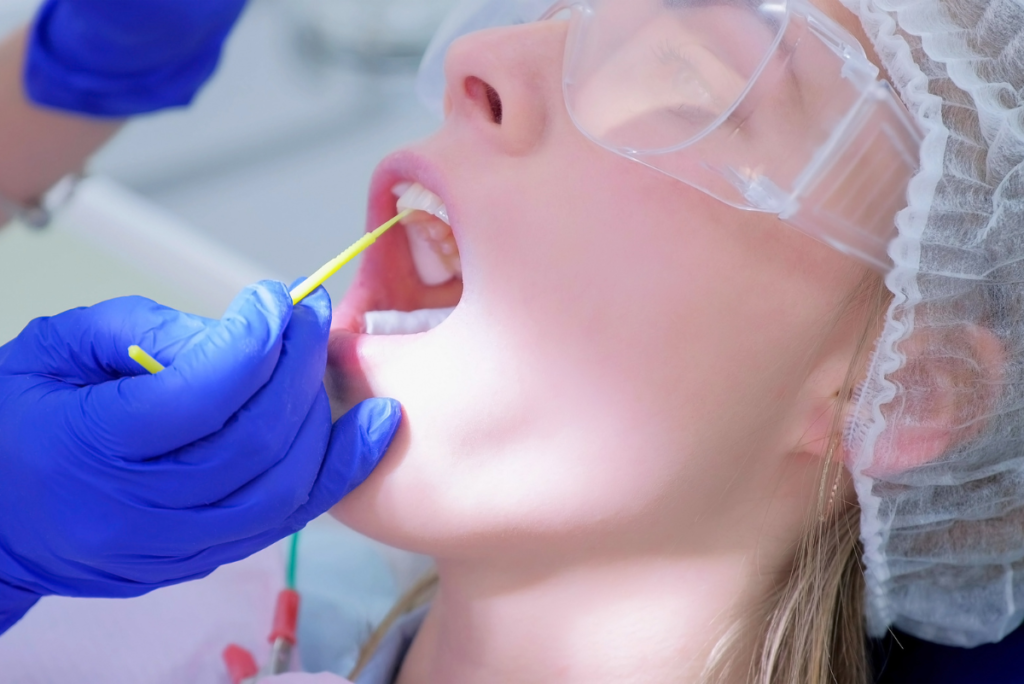
Related Articles The Benefits of Fluoride for Dental Health What Are Dental Implants? A Complete Guide The Ultimate Guide to Smile Makeovers for Teens The Benefits of Fluoride for Dental Health Written by Dr. Abhinav Kansal, BDS, MDS (Endodontist) Founder and Chief Dental Specialist at Kansal Dental Care, Meerut What is Fluoride? Fluoride is a naturally occurring mineral found in various foods and water. In dentistry, it’s used to strengthen teeth and reduce the risk of cavities. What Does Fluoride Do? Every day, your enamel—the protective outer layer of your teeth—gains and loses minerals. When acids from bacteria, plaque, and sugars attack your enamel, minerals are lost (demineralization). Conversely, minerals like fluoride, calcium, and phosphate are gained through food and water (remineralization). Fluoride helps prevent tooth decay by: Making enamel more resistant to acid attacks. Reversing early decay. Types of Fluoride Used in Dentistry Fluoride is available in various forms: Toothpaste and mouthwash: Low-strength options can be bought over the counter. Professional treatments: Dentists apply fluoride in the form of foam, varnish, or gel. Importance of Fluoride for Different Age Groups Fluoride is especially important for infants and children aged 6 months to 16 years. Developing teeth benefit significantly from fluoride. The American Dental Association (ADA) recommends avoiding excess fluoride in young children to prevent enamel fluorosis. For children, it’s advised to: Use a pea-sized amount of fluoride toothpaste. Spit out, rather than swallow, the toothpaste. Avoid fluoride mouth rinses unless recommended by a dentist. Do Adults Benefit from Fluoride? Yes! Adults can also benefit from fluoride, particularly those who: Experience dry mouth (xerostomia). Have a history of tooth decay. Use crowns, braces, or dentures. What Happens During a Fluoride Treatment? A fluoride treatment typically occurs during a routine dental exam. The dentist applies a fluoride gel, foam, or varnish to your teeth, and it usually takes less than five minutes. Benefits of Fluoride Fluoride provides several key benefits: Strengthens tooth enamel. Reduces the risk of cavities by approximately 25%. Reverses early tooth decay. Prevents the growth of cavity-causing bacteria. Is Fluoride Toxic? Fluoride is safe and effective when used properly, but high doses can be hazardous. Parents should supervise their child’s fluoride use to avoid overconsumption. Risks and Side Effects The most common side effect of fluoride is fluorosis, which leads to discoloration of teeth. It’s crucial to monitor fluoride intake, especially in young children. How Often Should I Have Fluoride Treatments? The frequency of fluoride treatments depends on individual oral health needs. Most people benefit from treatments every six months, but those prone to cavities may need them more often. Conclusion Fluoride is essential for maintaining oral health and preventing cavities. If you have concerns about fluoride or need professional fluoride treatments, contact us at Kansal Dental Care for personalized recommendations. Make your inbox smile!
Top Dental Care Tips for Families in Meerut
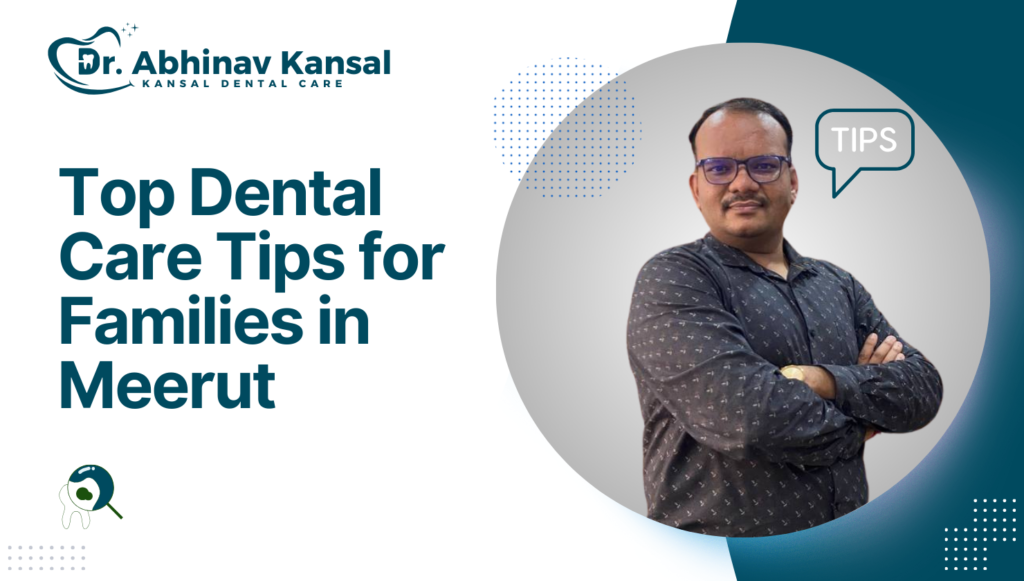
General Dental Health Top Dental Care Tips for Families in Meerut Abhinav Kansal September 25, 2024 Dr. Abhinav Kansal We understand just how closely connected oral health is to your overall health. Open Profile Share: Maintaining excellent dental care for families in Meerut is crucial for ensuring healthy smiles. At Kansal Dental Care, we understand that every family member, from young children to seniors, has unique dental needs. In this blog, we’ll share essential dental care tips specifically designed for families, helping you create good oral health habits at home. 1. Schedule Regular Dental Checkups One of the best ways to ensure good oral health for your entire family is by scheduling regular dental checkups. It is recommended to visit your dentist in Meerut at least twice a year for cleanings and checkups. Regular visits can help detect early signs of tooth decay, gum disease, or other dental issues, preventing more serious problems in the future. At Kansal Dental Care, we offer comprehensive dental checkups, ensuring that every member of your family gets personalized care. You can learn more about our services on our website. 2. Brush Twice a Day with the Right Technique Brushing your teeth twice a day is essential, but the way you brush is equally important. Use a soft-bristled toothbrush and fluoride toothpaste to gently clean all surfaces of your teeth. Make sure to brush for at least two minutes, covering the front, back, and chewing surfaces. Teaching children how to brush correctly from an early age will help them develop lifelong good habits. If you’re unsure if you’re brushing correctly, ask for a brushing demonstration at your next visit to Kansal Dental Care, located right here in Meerut. 3. Floss Daily to Remove Plaque Between Teeth Flossing is often overlooked but is crucial for maintaining good oral hygiene. Flossing removes food particles and plaque from between your teeth and along the gum line, areas that your toothbrush cannot reach. If you skip flossing, you’re leaving up to 35% of your tooth surface uncleaned! Encourage your family to floss daily, and for younger children, assist them until they can floss on their own. At Kansal Dental Care, we offer guidance on flossing techniques to ensure it becomes a family habit. 4. Limit Sugary Snacks and Drinks A diet high in sugar can lead to tooth decay, especially in children. Candies, sodas, and other sugary snacks fuel harmful bacteria in the mouth, leading to cavities. Instead, encourage your family to snack on healthier alternatives like fruits, vegetables, and nuts. Drinking plenty of water, especially after meals, helps wash away food particles and neutralize acids in the mouth. If your child loves sweets, try to limit them to mealtime when the production of saliva, which helps protect the teeth, is at its peak. 5. Use Fluoride for Stronger Teeth Fluoride is a mineral that helps strengthen tooth enamel and prevent cavities. Using fluoride toothpaste and drinking fluoridated water are great ways to protect your family’s teeth. In Meerut, our public water supply is fluoridated, but if you or your family members are at a higher risk of tooth decay, you might want to ask your dentist about fluoride treatments. At Kansal Dental Care, we offer professional fluoride treatments that provide an extra layer of protection for both children and adults. 6. Protect Teeth During Sports and Physical Activities If your children or family members participate in sports, it’s essential to protect their teeth from potential injury. Using a custom-made mouthguard can help prevent damage to the teeth, gums, and jaw. Whether it’s football, cricket, or another high-contact sport, a well-fitted mouthguard is an investment in long-term oral health. We can create custom mouthguards at Kansal Dental Care to ensure maximum comfort and protection. 7. Encourage Healthy Habits from a Young Age Children learn by observing their parents, so setting a good example is crucial. Make brushing and flossing a family activity, and involve your children in the process. Use fun toothbrushes, play their favorite songs while brushing, or create a reward system to encourage them to maintain a daily dental routine. Starting early with these healthy habits will set your child up for a lifetime of good oral health. 8. Address Dental Issues Early If you or a family member is experiencing tooth pain, sensitivity, or bleeding gums, don’t wait to visit the dentist. Early intervention can prevent minor issues from turning into serious dental problems. Whether it’s a cavity or gum disease, getting prompt treatment can save you discomfort and more complex dental work down the line. At Kansal Dental Care, we offer a wide range of treatments to address any dental issue quickly and effectively. From fillings and root canals to cosmetic treatments, our Meerut dental clinic is here to support your family’s needs. Share: Book a Consultation It’s easy and free!
Gum Disease: Causes, Symptoms, and Treatment
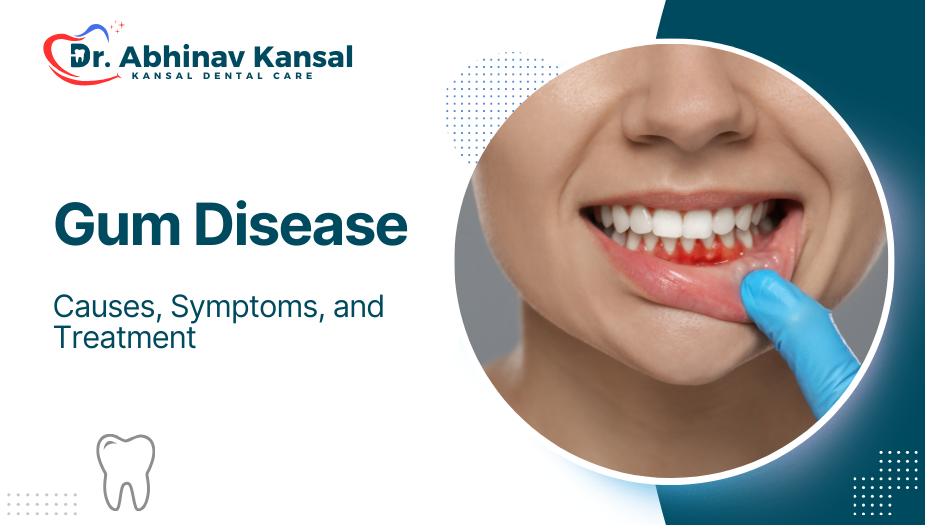
General Dental Health Gum Disease: Causes, Symptoms, and Treatment Abhinav Kansal August 23, 2024 Dr. Abhinav Kansal We understand just how closely connected oral health is to your overall health. Open Profile Share: Gum disease, or periodontal disease, is a common condition that affects the gums and the bone supporting your teeth. It can range from mild inflammation (gingivitis) to severe damage that can result in tooth loss. At Kansal Dental Care, we focus on providing comprehensive care to prevent, diagnose, and treat gum disease to maintain your oral health. Causes of Gum Disease he primary cause of gum disease is the buildup of plaque—a sticky film of bacteria—on your teeth. When plaque is not removed through regular brushing and flossing, it can harden into tartar, leading to gum infection. Other factors contributing to gum disease include: Smoking or chewing tobacco Hormonal changes Certain medications Medical conditions like diabetes Genetic predisposition Symptoms of Gum Disease Gum disease often starts with mild symptoms that can progress if not addressed. Common signs include: Swollen or bleeding gums Persistent bad breath Receding gums Loose or shifting teeth Painful chewing Treatment of Gum Disease Treating gum disease involves several approaches depending on the severity. Initial treatment may include professional cleanings to remove plaque and tartar. Advanced cases might require: Scaling and root planing: A deep cleaning technique to remove bacteria from below the gum line. Medications: Antibiotics or antimicrobial treatments to control infection. Surgical procedures: For severe cases, surgery might be needed to restore lost tissue or bone. Prevention of Gum Disease Preventing gum disease involves maintaining excellent oral hygiene and regular dental visits. Here’s how you can protect your gums: Brush twice a day with fluoride toothpaste Floss daily to remove plaque between teeth Use an antibacterial mouthwash Avoid tobacco products Schedule regular dental check-ups Conclusion Gum disease is a serious condition that can affect your overall health if left untreated. Regular dental visits and good oral hygiene practices are key to preventing and managing gum disease. If you’re experiencing symptoms, contact Kansal Dental Care for a thorough evaluation and personalized treatment plan. For more information on related topics, check out our article on early detection of oral cancer and learn more about gingivitis. Share: Book a Consultation It’s easy and free!
The Importance of Regular Dental Check-Ups
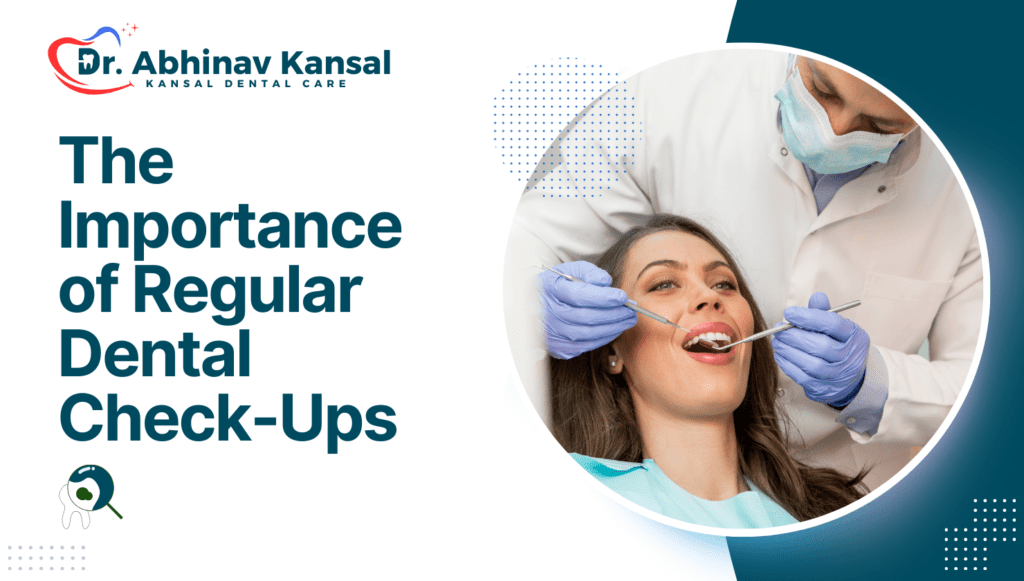
General Dental Health The Importance of Regular Dental Check-Ups Abhinav Kansal August 18, 2024 Dr. Abhinav Kansal We understand just how closely connected oral health is to your overall health. Open Profile Share: Regular dental check-ups are essential for maintaining optimal oral health. At Kansal Dental Care, we emphasize the importance of these routine visits, which play a crucial role in preventing dental issues before they become serious. This blog will explore why regular dental check-ups are vital for your overall health and well-being. What Happens During a Dental Check-Up? During a routine dental check-up, Dr. Abhinav Kansal will thoroughly examine your teeth, gums, and mouth. This includes checking for signs of tooth decay, gum disease, and other oral health issues. X-rays may also be taken to identify any problems that aren’t visible to the naked eye. Benefits of Regular Dental Check-Ups Prevention of Tooth Decay: Regular check-ups help in detecting early signs of tooth decay, allowing for timely intervention. Overall Health Monitoring: Your oral health is closely linked to your overall health. Regular check-ups help monitor conditions like diabetes and heart disease. Early Detection of Oral Cancer – Regular dental visits can help detect oral cancer in its early stages. How Often Should You Visit the Dentist? It’s recommended to visit the dentist at least twice a year for regular check-ups. However, depending on your oral health, Dr. Kansal may suggest more frequent visits. Conclusion Regular dental check-ups are a key component of maintaining good oral health. Don’t wait for problems to arise—schedule your next check-up with Kansal Dental Care today! Share: Book a Consultation It’s easy and free!
Periodontitis Gum Disease: Symptoms, Prevention, and Treatment
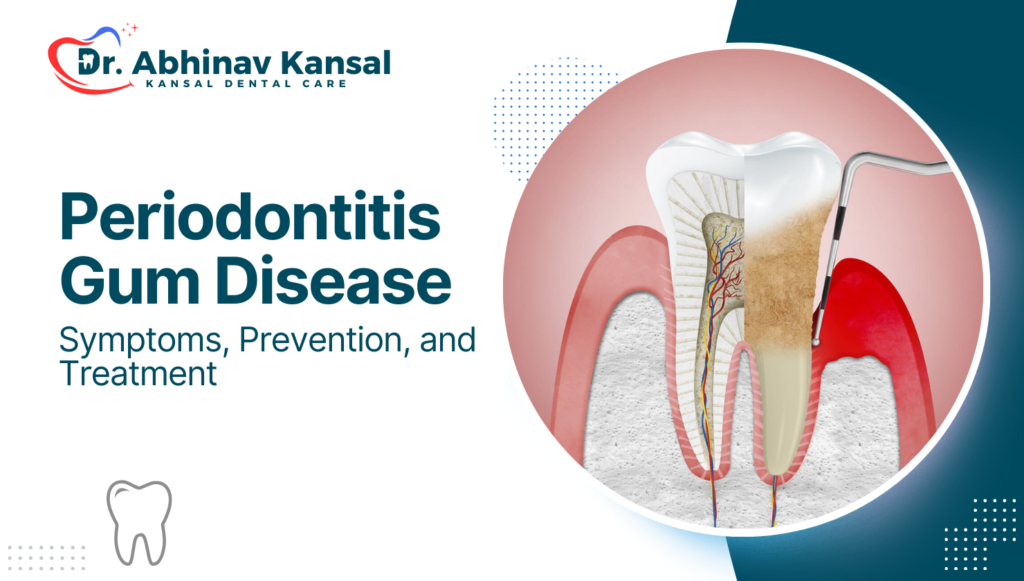
General Dental Health Periodontitis Gum Disease: Symptoms, Prevention, and Treatment Dentist July 28, 2024 Dr. Abhinav Kansal We understand just how closely connected oral health is to your overall health. Open Profile Share: Periodontitis, commonly known as gum disease, is a severe infection that damages the soft tissue and can destroy the bone that supports your teeth. Without treatment, it can lead to tooth loss or even increase the risk of heart and lung diseases. At Kansal Dental Care, Dr. Abhinav Kansal and our experienced team are dedicated to helping you prevent, diagnose, and treat periodontitis to maintain optimal oral health. Symptoms of Periodontitis Periodontitis often starts as mild gum inflammation, known as gingivitis. However, when left untreated, it can progress to more severe symptoms, including: Persistent bad breath Red, swollen gums Gums that bleed easily Painful chewing Receding gums Loose teeth Prevention of Periodontitis Preventing periodontitis involves maintaining excellent oral hygiene practices and making regular dental visits. Here’s how you can reduce your risk: Brush twice daily with fluoride toothpaste Floss daily to remove plaque between teeth Use an antiseptic mouthwash Regular dental check-ups and cleanings Avoid smoking, as it increases the risk of gum disease Treatment of Periodontitis Treating periodontitis may involve non-surgical procedures, such as scaling and root planing, where the dentist cleans the roots of the teeth to remove bacteria. In more severe cases, surgical treatments like flap surgery or bone grafting might be necessary to restore lost tissue and bone. Conclusion Periodontitis is a serious gum disease that requires prompt attention. Early detection and treatment are key to preventing long-term damage to your teeth and gums. If you’re experiencing symptoms of gum disease, don’t hesitate to contact Kansal Dental Care for an appointment. Share: Book a Consultation It’s easy and free!
